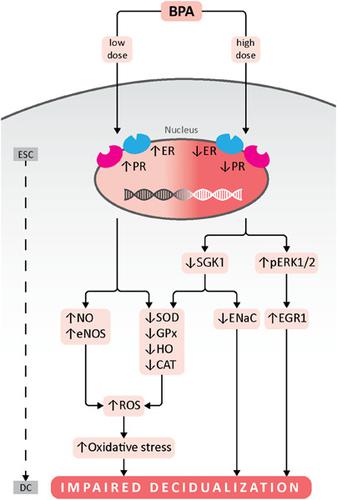当前位置:
X-MOL 学术
›
Mol. Reprod. Dev.
›
论文详情
Our official English website, www.x-mol.net, welcomes your feedback! (Note: you will need to create a separate account there.)
Bisphenol A-induced mechanistic impairment of decidualization.
Molecular Reproduction and Development ( IF 2.5 ) Pub Date : 2020-07-20 , DOI: 10.1002/mrd.23400 William Nelson 1, 2 , Enoch Appiah Adu-Gyamfi 1 , Armin Czika 1 , Ying-Xiong Wang 1 , Yu-Bin Ding 1
Molecular Reproduction and Development ( IF 2.5 ) Pub Date : 2020-07-20 , DOI: 10.1002/mrd.23400 William Nelson 1, 2 , Enoch Appiah Adu-Gyamfi 1 , Armin Czika 1 , Ying-Xiong Wang 1 , Yu-Bin Ding 1
Affiliation

|
Decidualization is a crucial precedent to embryo implantation, as its impairment is a major contributor to female infertility and pregnancy complications. Unraveling the molecular mechanisms involved in the impairment of decidualization has been a subject of interest in the field of reproductive medicine. Evidence from several experimental settings show that exposure to bisphenol A (BPA), an endocrine‐disrupting chemical, affects the expression of several molecules that are involved in decidualization. Both low and high doses of BPA impair decidualization through the dysregulation of estrogen (ER) and progesterone (PR) receptors. Exposure to low doses of BPA leads to decreased levels and activities of several antioxidant enzymes, increased activity of endothelial nitric oxide synthase (eNOS), and increased production of nitric oxide (NO) via the upregulation of ER and PR. Consequently, oxidative stress is induced and decidualization becomes impaired. On the other hand, exposure to high doses of BPA downregulates ER and PR and impairs decidualization through two distinct pathways. One is through the upregulation of early growth response‐1 (EGR1) via increased phosphorylation of extracellular signal‐regulated protein kinases 1 and 2; and the other is through a reduced serum glucocorticoid‐induced kinase‐1 (SGK1)‐mediated downregulation of epithelial sodium channel‐α and the induction of oxidative stress. Thus, regardless of the dose, BPA can impair decidualization to trigger infertility and pregnancy complications. This warrants the need to adopt lifestyles that will decrease the tendency of getting exposed to BPA.
中文翻译:

双酚A诱发蜕膜化的机械损伤。
蜕膜决定化是胚胎植入的关键先例,因为它的损害是女性不育和妊娠并发症的主要原因。揭开蜕膜化损伤所涉及的分子机制一直是生殖医学领域的研究热点。来自多个实验设置的证据表明,暴露于破坏内分泌的化学物质双酚A(BPA)会影响蜕膜化过程中涉及的几种分子的表达。高和低剂量的BPA都会通过雌激素(ER)和孕激素(PR)受体的失调而损害蜕膜功能。暴露于低剂量的BPA会导致几种抗氧化酶的水平和活性降低,内皮一氧化氮合酶(eNOS)的活性增加,通过上调ER和PR来增加一氧化氮(NO)的产生。因此,诱发了氧化应激并且蜕膜化受损。另一方面,暴露于高剂量的BPA会通过两种不同的途径下调ER和PR,并削弱蜕膜功能。一种是通过增加细胞外信号调节蛋白激酶1和2的磷酸化来上调早期生长反应-1(EGR1)。另一种是通过降低血清糖皮质激素诱导的激酶-1(SGK1)介导的上皮钠通道α下调和氧化应激的诱导。因此,无论剂量如何,BPA都会损害蜕膜功能,引发不孕和妊娠并发症。因此,有必要采取能够减少接触BPA的生活方式。
更新日期:2020-08-28
中文翻译:

双酚A诱发蜕膜化的机械损伤。
蜕膜决定化是胚胎植入的关键先例,因为它的损害是女性不育和妊娠并发症的主要原因。揭开蜕膜化损伤所涉及的分子机制一直是生殖医学领域的研究热点。来自多个实验设置的证据表明,暴露于破坏内分泌的化学物质双酚A(BPA)会影响蜕膜化过程中涉及的几种分子的表达。高和低剂量的BPA都会通过雌激素(ER)和孕激素(PR)受体的失调而损害蜕膜功能。暴露于低剂量的BPA会导致几种抗氧化酶的水平和活性降低,内皮一氧化氮合酶(eNOS)的活性增加,通过上调ER和PR来增加一氧化氮(NO)的产生。因此,诱发了氧化应激并且蜕膜化受损。另一方面,暴露于高剂量的BPA会通过两种不同的途径下调ER和PR,并削弱蜕膜功能。一种是通过增加细胞外信号调节蛋白激酶1和2的磷酸化来上调早期生长反应-1(EGR1)。另一种是通过降低血清糖皮质激素诱导的激酶-1(SGK1)介导的上皮钠通道α下调和氧化应激的诱导。因此,无论剂量如何,BPA都会损害蜕膜功能,引发不孕和妊娠并发症。因此,有必要采取能够减少接触BPA的生活方式。


























 京公网安备 11010802027423号
京公网安备 11010802027423号